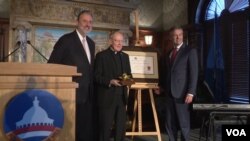The Dutch reputation for thriftiness is not entirely without justification, acknowledged Hendrik Jan Jurriaan Schuwer as he prepared to wrap up his mission as the Netherlands' ambassador to the United States.
His countrymen have long believed that "what you don't have, you cannot spend," Schuwer says in explaining the philosophy behind the expression "go Dutch," meaning to share a restaurant or other bill.
"My parents bought their house basically with cash. I bought my first house with a mortgage, and my father called me and explained to me that I had sold my soul to the devil," Schuwer relates with a laugh.
"Now I think everybody in Holland has a mortgage," he adds during an hour-long interview in his simply furnished Washington office. But for the generation that had gone through the Second World War, the credo was "don't be ostentatious, don't spend too much, etc., etc." Even today, Schuwer says, many Dutch people insist on living strictly within their means, especially in the countryside. There, he says, one still hears the expression, "One cookie is more than enough with the tea, not two cookies."Despite having enjoyed a long career representing his country abroad – including a dozen years in the U.S. -- Schuwer can still feel nostalgic for his homeland, especially its capital city Amsterdam.
"At 10 o'clock on Sunday morning, you can sit outside on the canal and drink your coffee; the city is slowly waking up -- people have all been out partying on Saturday evening. You can look out and imagine: This is what it looked like in 1650."
Take away the automobiles, "all the houses are basically the same [as they were in 1650]," he says; "the cobblestones on the streets are the same, the boats on the canals are the same, the little bridges are still the same; it's wonderful to have a place where you can go back in time."
As evidence, he points to the works of the great Dutch Masters such as Rembrandt and Vermeer. Look at their paintings, he says, and "you'll know we have the [same] plans of the city of Amsterdam."
The thoughts of home put Schuwer into a reflective mood.
"If I hadn't become a diplomat, I would have liked to work at the Port of Rotterdam, as a harbormaster," he confides, sharing a mental image of the ships "that come from China, from Brazil, from the United States, or wherever; the getting together of all those people who bring their stories, their colors, their smells and their products."
The Dutch, he says, "are very much geared toward trading and therefore toward the outside world."
Indeed, the Dutch have long been a trading and seafaring people, having once maintained a colonial empire stretching from South America to Indonesia. Even today, "the Kingdom of the Netherlands consists of four autonomous countries: the Netherlands, Aruba, Curaçao and St Maarten. The latter three are located in the Caribbean," according to the Dutch government.
"Whereas other peoples would go on the road, we would go on the water," Schuwer says.In fact, he points out, a large part of his country's European land territory was reclaimed from the sea through a system of dykes and landfills. "We have a saying that ‘God created the world, except Holland was created by the Dutch'."
Asked which myths about the country he wishes to debunk, Schuwer points to a pair of clogs sitting not far from the window in his office: "I have never worn clogs in my entire life, I can tell you that!"
Instead of clogs and windmills, he says, he wishes the Netherlands was better known for its innovative spirit and high-tech creations, including WiFi.
Still, the Dutch continue to treat their finances seriously, including putting limits on their bankers' income.
Bonus payments for bankers in the Netherlands are limited to 20% of their total salary, meaning a banker earning $500,000 a year cannot receive a bonus of more than $100,000, he explains.
"Jaime Dimon wouldn't want to live in the Netherlands, I can tell you that," Schuwer says. Dimon is the chairman and CEO of JPMorgan Chase, the largest American bank. His reported total compensation for 2018 was $31 million, most of which is attributed to performance-based incentives.
Schuwer acknowledges that there are consequences to such policies.
"Brexit is coming, a lot of the banking sector is moving from London to other places, [but] we see very few banks coming to the Netherlands," he says. If they did, they would be subject to Dutch regulations and most of them don't seem prepared to do that. The one exception, he notes, is banks from Japan, which has similar rules to the Dutch.
The Netherland ranks among the wealthiest countries, Schuwer says, but the Dutch are "rich in a different way" from Americans. "The distance between rich and poor is much smaller."




